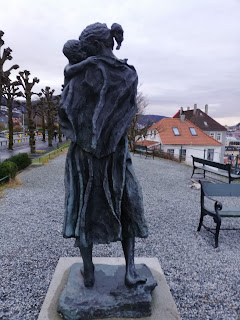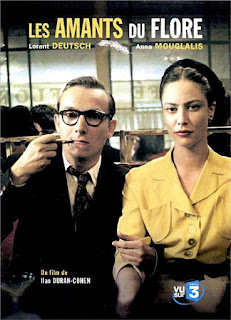existing as an immigrant in Bergen
I went to a panel discussion today called “Job Creation for and by Immigrants and Internationals”. I did not really know what to expect. What called my attention was the inviting playing with words. “For and by”. The immigrants themselves seem like creators, facilitators, doers. Is that it? Yes, exactly.
The woman responsible for the panel said in the beginning that what she wanted to address with us were the challenges that skilled immigrants face in Norway. It was a great surprise to see in front of me a panel made of six black women. Just this image would have been worth the night for me. I imagine that most people in Norway associate the expression “skilled immigrants” with white, European men from North Europe. Because of that simply the gesture to expand the social mirror would have been worth the hours listening to Chisom Udize, Leila Rezzouk Rossow, Fungi Otemoller, Dora Poni Loro, Kathleen Offman Mathisin, and Irene Kinunda Afriyie.
But I got much more than that. Do you know the cozy feeling of been hugged by understanding after a long cold winter went through you? That was how I felt. I’ve been in Norway for almost five years now. I am definitely not an example of a well-integrated, neither a well-assimilated immigrant. I am an outsider. I am learning how to be a joyful outsider that at times finds its momentary place in the streets of Bergen. But for a long while, I was simply an angry and lonely outsider that did not even find the words to explain how isolated she felt.
Today, Chisom Udize, started the conversation with an injection of honesty. She said that she lived in many countries before, but that Norway was the first place where she found it very difficult to be able to be herself. Before continuing to share what I heard these wonderful women saying I should clarify that I cannot be a hundred percent sure about how much they actually said and how much was made up by my own obsessions. What I am sharing here is how I received their reflections. It is kind of an unfiltered conversation between their sharing and my obsessions. Thus, if any of what I am writing here pisses you off, I am the only one to blame.
Chisom presented herself as a “love migrant” that came to Norway with a job after marrying a Norwegian guy. Despite the circumstances of her arrival, she confesses that she struggled a lot to integrate into Norwegian society. With a great sense of humor, she talks about the depressive mode that she felt into. “I got angry with everything and everyone, including my husband, for bringing me to this cold place”. She says that even fish, which she used to like before, she started to hate because it was such a Norwegian thing. In Norway, for a while, she felt like she was not allowed to be herself. There was an obligation to shrink.
I’ve heard before the expression the obligation to be grateful, that Hannah Arendt uses so well to explain the assimilation imposed on refugees. I knew that for me, an immigrant that is not a refugee, but instead an economic migrant, such expression was not exactly appropriate. It is not really that I have an obligation to be grateful. After all, contrarily to refugees, I am not in the place of those that are (mistakenly) seem like absolute victims that need to be saved. However, I am in this place of a foreigner, of someone that is welcome but just until that specific line and just as long as I can give the right answers. I did not know how to name this experience of existing as a foreigner in Norway, until today. Part of it is this obligation to shrink. An obligation to not say everything that you think or see. Trying to fulfill this obligation, blindly, it becomes very easy to lose oneself. Shortly, the obligation to shrink is the obligation to assimilate.
And talking of assimilation what is the difference between assimilation and integration? Is there a difference in practice?
Arendt denounces that assimilation is existentially harmful because it robs a person of her possibilities to be who she is, forcing her to exist simply as a what. In my case, if I would assimilate, I would be a Brazilian mother living in Norway, unable to participate in public life with my distinctiveness. I did not assimilate, but for a while, all that I could be were my what. A mother, a Brazilian woman, a student of philosophy, a foreigner. I found a job as a cleaner. I did not really think about what I was doing. I did what I was told that I should do. “If you really want to work there are opportunities in Norway”. It is not easy to find words to explain. It is simply too much. The loneliness, the lack of the language, the lack of interest in who you are, the impossibility to show who you are, the life in the place that societal rules define as your place in this society. As a foreigner you should start working as a cleaner, or in the barnehage or at Kiwi. I tried. I was not one of the strong ones. The days of raw invisibility and mechanic work made me feel even more lonely and incapable. When I realized I’ve become just this mass of nothingness. Without the chance of acting as who I was, I kind of forgot who I was. To rediscover me was not easy. It is not easy. But it is possible. I know that there is a difference between assimilation and integration.
To be integrated is to find ways to be part of Norwegian society where I can still be myself. In practice that might be very challenging, as Irina reminds us with her great sense of humor. She confessed that often she wonders whether or not she is integrated now. Was she integrated after finding a job? Or the integration only came that day when she accepted her friend’s invitation to hang in the woods? Does the amount of rain in Bergen play a role in her integration process? After all, it is in part because of the rain that she does not make use of her African wardrobe very often.
From what they all shared what I heard is that to be truly integrated one needs to kind of find a balance between knowing who one is and understanding the society where she is. Moreover, they all seemed to agree that to be able to do that one needs to find or to invent a community to be a part of. I could not agree more. Not that long ago I started building my own little community made of amazing, strong women here in Bergen. It is this real-life working in progress creative project of friendship that gives me hope that maybe one day I will feel like I belong here.
For me to belong somewhere is to feel like I can simply exist, without having to resist all the time. They talked about belonging today as well. The stories they had to share were different. For one, Bergen knows how to be a home, for now. But she does not really belong here, and what reminds her of that are those shoulders that here are not really able to relax. For others what was urgent to share was that one does not need to be able to belong to just one place. One feels like she belongs here and also to her first home. Wherever her family is, is where she belongs. She also said, in another moment of the conversation that luckily, she was not born in Norway. “I was born and raised in a small village in Congo. I grew up climbing trees and eating fruits. I wish everyone was born there”. I found it so beautiful and raw. For someone like her, that does not fit into the Norwegian social mirror, it is not easy to be born in Norway. You always need to deal with the question “but where are you really from?” as if because of the color of your skin there would be an intrinsic impossibility of been a hundred percent Norwegian. She does not dream with been a hundred percent Norwegian. Instead, she dreams of a world where everyone could know the joy of belonging to a tree and knowing the sweetness of fresh fruit. More importantly, she is busy being herself, no matter where she is, and even though in this unjust world the way we treat refugees often imposes on them the obligation to become whoever their saver wants them to be.
It was great to spend a few hours listening to those brave women talking about the problems that they face in Norway as immigrants. What amazed me the most was their strength to point out the injustices and problems, such as racism, unconscious biases, without letting their hopes die. They are constantly asking themselves how they can be part of the solution. I asked them in the end what is the place of anger in their process of becoming who they are in Norwegian society. With different words, they all acknowledged that although anger is part of what they experience they all do a conscious effort to channel it constructively, which somehow finds its place in their projects of making themselves visible. Because at the end of the day, to have a chance to belong, one needs to feel like what she does and what she has to say matter. Otherwise one ends up feeling like she does not matter, and she should be satisfied with the margins of society. This is why, on one hand, it is so important when one of us finds the courage to say “I belong to Norway and Norway is lucky to have me here”. On the other hand, it is also important to acknowledge that for women of color in Norway it is a struggle to invent ways to belong. As Chisom puts it: “I struggle with belonging in Norway. In an African country, I didn’t have to think four sentences ahead. Norway is slowly becoming home. But not because it was given to me. But because I’m fighting for it. I’m building my community. I started inviting people for coffee. On the other hand, there is a constant reminder that I don’t quite fit in. Also, in Nigeria, I’m just me. I don’t represent all the other immigrants that are coming after me”.
In sum, it was a gift to be surrounded by powerful foreign women that challenge the places that are normally seen as the appropriate ones for those that look like us, that is, those that do not kind of fit into the Norwegian social mirror, yet.




Comments
Post a Comment